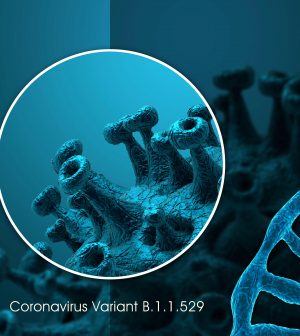- Could Artificial Sweeteners Be Aging the Brain Faster?
- Techniques for Soothing Your Nervous System
- Does the Water in Your House Smell Funny? Here’s Why
- Can a Daily Dose of Apple Cider Vinegar Actually Aid Weight Loss?
- 6 Health Beverages That Can Actually Spike Your Blood Sugar
- Treatment Options for Social Anxiety Disorder
- Understanding the Connection Between Anxiety and Depression
- How Daily Prunes Can Influence Cholesterol and Inflammation
- When to Take B12 for Better Absorption and Energy
- Epsom Salts: Health Benefits and Uses
COVID Meds Appear to Work Against BA.2 Omicron Variant

A number of COVID medications have proven their mettle against the “stealth” BA.2 Omicron variant in lab tests, but it’s not clear how effective they would be in real-world use, researchers report.
Some evidence suggests that BA.2 can spread more quickly than the already highly contagious earlier BA.1 variant.
In lab experiments using non-human primate cells, researchers tested seven monoclonal antibodies, three combinations of antibodies, and three antiviral treatments against the BA.2 variant. Most approved antibody treatments are a combination of different antibodies.
The antiviral therapies remdesivir, Merck’s molnupiravir and the active ingredient in Pfizer’s Paxlovid pill (nirmatrelvir) worked against the BA.2 variant, according to the study published March 9 in the New England Journal of Medicine.
According to the findings, the most effective antibody treatment against the BA.2 variant was AstraZeneca’s Evusheld (tixagevimab co-packaged with cilgavimab), which is approved in the United States to help prevent COVID infection in people vulnerable to severe disease.
Antibody treatments form Regeneron and GlaxoSmithKline were more effective against BA.2 than they are against the BA.1 variant, but were not as strong against BA.2 as they were against earlier versions of the virus.
The researchers also found that Lilly’s antibody cocktail of etesevimab and bamlanivimab did not neutralize the BA.2 virus at common dosages.
“The bottom line is we have antibodies that appear to be more effective against BA. 2 compared with BA.1 or BA.1.1. That’s good news, but we don’t know whether what we found in the lab translates into clinical settings,” said study leader Yoshihiro Kawaoka, a virologist at the School of Veterinary Medicine at the University of Wisconsin-Madison and the University of Tokyo.
“We also tested clinically available antiviral compounds, and they are all highly efficacious,” he added in a University of Wisconsin news release.
Current COVID treatments tend to be less effective against new variants than against the original virus because they were designed and tested against earlier versions of the virus, the study authors noted.
It takes months to create and test treatments against new variants of the virus.
More information
There’s more on COVID-19 variants at the U.S. Centers for Disease Control and Prevention.
SOURCE: University of Wisconsin-Madison, news release, March 10, 2022
Source: HealthDay
Copyright © 2026 HealthDay. All rights reserved.










